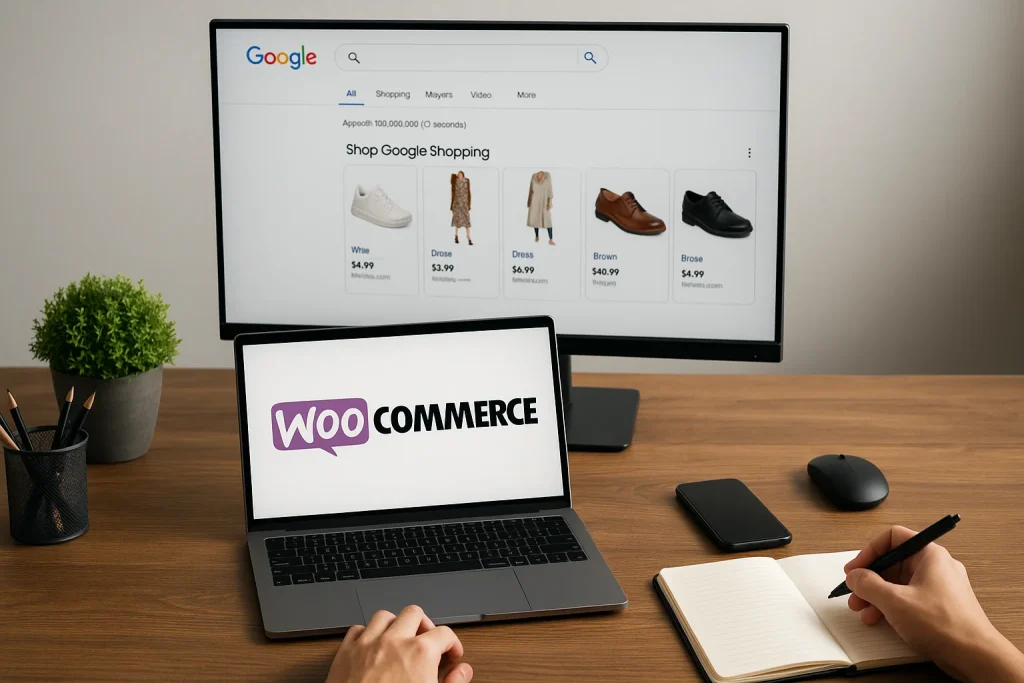Launching new products in the world of ecommerce is both exciting and challenging. While the potential to capture new customers and expand market share is significant, the hurdles can be equally substantial. Online stores often face difficulties in achieving product visibility, driving quality traffic, and converting visitors into buyers. Even with a well-designed WooCommerce store, products can remain invisible without the right marketing strategy in place. For businesses looking to make an impact from day one, collaborating with a Google Shopping agency and leveraging professional WooCommerce development services can make the difference between a successful launch and a missed opportunity.
Careful planning before a product launch ensures that technical aspects, marketing campaigns, and customer experience are all aligned. Many ecommerce owners underestimate the importance of this synchronization, assuming that simply adding a product to their store and running ads is sufficient. In reality, launching without a structured approach can result in wasted ad spend, frustrated customers, and underperforming campaigns. By working with specialists in both advertising and store development, businesses can ensure that their products reach the right audience with the right messaging, supported by a technically sound and optimized online store.
This article explores the critical factors that make partnering with a Google Shopping campaign agency and engaging WooCommerce developers essential for product launches. We will examine the challenges and trade-offs involved, highlight the importance of timing, and provide insights into how careful coordination can improve the likelihood of a successful launch.
Readers also enjoyed this connected article—check it out.
Understanding the Role of a Google Shopping Agency
A Google Shopping campaign agency plays a crucial role in the success of new product launches. These agencies specialize in managing Google Shopping ads, ensuring that products are presented in search results in a way that maximizes visibility and click-through rates. Their responsibilities go beyond simply setting up campaigns; they manage product feed optimization, ad creation, bid strategy, and ongoing performance monitoring.
Product feeds are at the core of Google Shopping campaigns. A well-structured feed includes accurate titles, descriptions, pricing, availability, and images. Even minor errors in this data can lead to disapproved ads or low visibility. Agencies ensure that feeds meet Google’s requirements and are continuously updated to reflect inventory changes or price adjustments. This is particularly important for businesses launching multiple new products, as any inconsistencies can impact the overall effectiveness of campaigns.
Choosing to work with an agency also addresses the trade-off between outsourcing expertise and managing campaigns internally. While some ecommerce owners attempt to handle campaigns themselves, they may lack the technical know-how, time, or access to advanced tools required to optimize results. A Google Shopping ads agency brings experience, best practices, and industry insights that can accelerate campaign performance. On the other hand, outsourcing requires investment and trust, so businesses must weigh the cost against the potential benefits of higher visibility and increased sales.
By integrating agency expertise early, businesses can avoid common pitfalls such as poor targeting, ineffective bidding, and misaligned product listings. The early involvement of a Google Shopping campaign agency sets the foundation for a launch that is structured, data-driven, and capable of delivering measurable results.
The Importance of WooCommerce Development Services in Product Launches
Technical readiness is just as important as marketing strategy when launching new products. WooCommerce developers ensure that the online store is fully equipped to handle new product listings, customer traffic, and sales processes. Proper development impacts not only the functionality of the store but also the effectiveness of advertising campaigns.
A robust WooCommerce setup addresses several critical areas. Structured product data, optimized website speed, mobile responsiveness, and intuitive navigation all contribute to a smooth shopping experience. Structured data, for instance, enables search engines and advertising platforms to interpret product information accurately, which can improve the performance of Google Shopping campaigns. Similarly, optimized images, secure payment gateways, and reliable inventory management reduce the risk of errors that can frustrate customers and disrupt sales.
The trade-offs in development often revolve around time and cost. Investing in comprehensive WooCommerce eCommerce development services upfront may delay the product launch, but it ensures that the store is capable of supporting marketing efforts effectively. Conversely, launching quickly with minimal development may save time initially but can lead to long-term issues such as poor user experience, technical glitches, and lower ad performance.
WooCommerce developers also play a crucial role in integrating tracking and analytics tools, which are essential for measuring campaign effectiveness. Without proper integration, it becomes difficult to monitor conversions, ROI, and user behavior. Agencies rely on accurate data to make informed adjustments to campaigns, so technical readiness directly influences marketing success.
Timing and Coordination Between Development and Marketing
One of the most overlooked aspects of a new product launch is the timing and coordination between store development and marketing campaigns. Ideally, technical setup and advertising strategy should be planned and executed in parallel. Misalignment can result in missed opportunities, wasted budget, and reduced visibility.
Launching products before the store is fully optimized can create challenges such as broken product feeds, incomplete product descriptions, or slow-loading pages. These issues can cause disapproved ads, low-quality scores, and high cost-per-click rates. On the other hand, waiting too long to launch may allow competitors to capture market share and diminish early momentum.
Businesses must balance the desire for a quick launch with the need for technical readiness and effective advertising. Strategies such as phased rollouts, soft launches, or pilot campaigns can help mitigate risks. For example, a store may launch a limited set of products initially while ensuring that the technical infrastructure supports Google Shopping campaign requirements. This approach allows for early testing, performance assessment, and incremental optimization.
Coordination also extends to internal teams. Marketing professionals, product managers, and developers need clear communication channels to synchronize product information, campaign assets, and launch schedules. A Google Shopping campaign agency can facilitate this coordination, ensuring that product feeds are ready, campaigns are scheduled, and technical issues are resolved before the full launch.
Optimizing Product Feeds for Maximum Visibility
Product feed optimization is a central component of successful Google Shopping campaigns. High-quality feeds increase visibility, improve ad relevance, and enhance the likelihood of conversions. For WooCommerce stores, the quality of product feeds depends heavily on the technical setup provided by development services.
Key considerations for feed optimization include accurate product titles, descriptive and keyword-rich product descriptions, high-resolution images, and precise inventory and pricing information. Variations in product data, inconsistencies in SKUs, and missing images can lead to disapproved ads or low visibility in search results.
Challenges arise when launching multiple products simultaneously. Maintaining feed quality across a large catalog requires careful planning and ongoing monitoring. Agencies use automated tools to detect errors, implement updates, and ensure compliance with Google’s policies. This allows businesses to focus on other aspects of the launch while maintaining high feed standards.
Trade-offs in feed optimization involve balancing detail with efficiency. While providing comprehensive information increases ad relevance, overly long descriptions or excessive attributes can complicate feed management. Agencies help strike a balance, ensuring that product data is complete, accurate, and optimized for both users and search algorithms.
Targeting, Bidding, and Budget Allocation
Targeting and bidding strategies are fundamental to the success of Google Shopping campaigns. A Google Shopping campaign agency brings expertise in selecting the right audience segments, setting appropriate bids, and allocating budgets effectively to maximize return on investment.
Trade-offs exist between broad targeting and niche focus. Broad targeting may increase reach but dilute ad relevance, leading to lower conversion rates. Niche targeting improves ad relevance but may limit exposure, especially for new products with no historical performance data. Agencies analyze product performance, market trends, and competitive data to find the optimal balance.
Budget allocation is another critical consideration. Launching a new product without historical data makes it challenging to predict cost-per-click and conversion rates. Agencies use phased approaches, testing campaigns with smaller budgets before scaling, to minimize risk while collecting performance insights.
These strategies highlight the importance of informed decision-making. Marketing efforts that are disconnected from technical readiness, feed quality, or campaign expertise are likely to underperform. By integrating campaign management and development services, businesses can ensure that targeting, bidding, and budgeting decisions are based on reliable data and aligned with product launch goals.
Measuring Success and Iterative Optimization
Launching a product is not the endpoint; continuous measurement and optimization are essential. Key performance indicators such as click-through rates, conversion rates, return on ad spend, and cost-per-click provide insights into campaign effectiveness and guide ongoing adjustments.
WooCommerce developers contribute to measurement accuracy by ensuring proper integration of analytics tools, conversion tracking, and structured data. Without these systems, it is difficult to assess the true performance of campaigns or understand customer behavior. Inaccurate data can lead to misguided decisions and wasted resources.
Iterative optimization involves testing different ad creatives, bidding strategies, and product feed configurations. Agencies conduct A/B testing, analyze results, and make incremental improvements to maximize performance. Trade-offs include deciding which elements to prioritize for testing, balancing short-term gains with long-term strategy, and allocating resources efficiently.
For new product launches, the first few weeks are critical. Early insights inform decisions about scaling campaigns, adjusting targeting, and refining product presentation. Businesses that fail to monitor and adapt their strategies may miss opportunities to capitalize on initial interest and momentum.
Challenges and Considerations for Small vs. Large Stores
The requirements for a successful launch differ based on the size and complexity of the WooCommerce store. Small stores may have fewer products and simpler technical needs, while larger stores often deal with extensive catalogs, complex inventory management, and diverse marketing channels.
Budget constraints are a significant factor for small businesses. Hiring both a Google Shopping ads agency and professional WooCommerce developers may represent a substantial investment. However, the potential ROI from optimized campaigns, reduced errors, and improved conversion rates often justifies the expenditure.
Larger stores face different challenges, such as managing high volumes of product data, coordinating multiple teams, and ensuring consistency across all campaigns. Agencies help mitigate these risks by implementing scalable processes, automated feedmanagement, and comprehensive campaign monitoring. The trade-offs for larger stores often revolve around the balance between internal resources and outsourcing expertise. While large teams can manage campaigns internally, the complexity and scale of operations can make it more efficient and cost-effective to collaborate with specialized Google Shopping campaign agencies and WooCommerce eCommerce development services.
Timing considerations are also crucial. For small stores, delays in launching products to ensure technical readiness may impact early sales opportunities. In contrast, larger stores can often afford phased launches, allowing teams to test campaigns with a subset of products while fine-tuning technical infrastructure for the full catalog. In both cases, strategic planning ensures that product launches align with marketing goals and customer expectations.
Risk Management and Avoiding Common Pitfalls
Launching new products without professional guidance introduces multiple risks. Disapproved ads, low visibility, mismanaged bids, and inaccurate product feeds are just a few of the challenges that can undermine a launch. These risks often stem from insufficient technical setup, lack of experience with Google Shopping campaigns, or misalignment between development and marketing teams.
WooCommerce developers help mitigate these risks by creating a reliable, optimized store environment. They ensure that product pages load quickly, inventory is correctly managed, and structured data is implemented for better search engine comprehension. Technical errors not only frustrate customers but also impact the performance of paid campaigns, leading to wasted advertising spend.
Google Shopping ads agencies address risks on the marketing side. They monitor campaigns for compliance with Google’s policies, optimize bids to prevent overspending, and adjust targeting to reach the most relevant audience. They also conduct ongoing performance analysis, allowing for rapid response to unexpected trends or issues.
A key challenge is balancing speed with quality. Many businesses feel pressured to launch quickly to capitalize on market opportunities. However, launching prematurely without addressing technical and marketing readiness can result in suboptimal outcomes. The decision-making process must weigh the benefits of early market entry against the potential costs of poor execution. Engaging specialists ensures that risks are systematically managed, enabling a smoother, more predictable launch.
Strategic Considerations for Long-Term Success
The decision to involve a Google Shopping campaign agency and professional WooCommerce development services extends beyond a single product launch. These partnerships lay the groundwork for ongoing success, providing scalable systems and optimized processes that support future product introductions.
For instance, once a robust product feed system is in place, it becomes easier to onboard additional products without errors or delays. Similarly, well-developed WooCommerce infrastructure allows for seamless integration of new features, plugins, or payment methods as the business grows. By investing in quality development and marketing support early, businesses create a foundation for sustainable growth.
Trade-offs in strategic planning often involve balancing immediate costs with long-term benefits. While outsourcing campaigns and development services requires upfront investment, the efficiency, expertise, and reduced risk often lead to higher overall ROI. Businesses must also consider resource allocation, ensuring that internal teams are empowered to focus on strategic priorities rather than troubleshooting technical or marketing issues.
Additionally, understanding customer behavior and market trends is vital. Agencies provide insights and data that help refine targeting, optimize ad creative, and identify opportunities for expansion. Combining these insights with a technically sound WooCommerce store enables data-driven decision-making, which is critical for maximizing performance in competitive ecommerce environments.
The Value of Coordination and Communication
Successful product launches depend on effective coordination between development and marketing teams. Misalignment can lead to duplicated efforts, missed deadlines, and inconsistent product information across platforms. Clear communication ensures that campaigns are launched in tandem with technical readiness, minimizing disruptions and maximizing efficiency.
Google Shopping campaign agencies often act as intermediaries between technical teams and marketing teams. They translate marketing objectives into actionable campaign plans while ensuring that technical requirements are met. For example, they may coordinate with WooCommerce developers to implement structured data correctly or to update inventory feeds in real-time.
Challenges in coordination typically arise from unclear responsibilities, lack of standardized processes, or differing priorities between teams. Establishing a launch checklist, shared timelines, and regular status updates can mitigate these challenges. This approach ensures that both the technical and marketing aspects of a launch are synchronized, creating a seamless experience for the end customer.
Final Thoughts
Launching new products in a WooCommerce store is a complex process that requires careful planning, technical readiness, and strategic marketing. Partnering with a Google Shopping agency ensures that campaigns are optimized, product feeds are accurate, and ad spend is used effectively. Simultaneously, leveraging professional WooCommerce development services guarantees that the store can handle increased traffic, support accurate product data, and provide a seamless customer experience.
The integration of these two areas—marketing and development—before product launch is critical. Businesses that invest in coordination, technical optimization, and campaign expertise are better positioned to achieve visibility, attract the right audience, and maximize conversions. While there are trade-offs in terms of cost, timing, and resource allocation, the benefits of a structured, data-driven approach far outweigh the risks of launching without proper support.
Ultimately, careful planning, informed decision-making, and collaboration between specialists enable businesses to launch products successfully, laying a strong foundation for future growth. By prioritizing both technical readiness and marketing strategy, ecommerce brands can ensure that their WooCommerce store not only launches new products effectively but also sustains performance in a competitive online marketplace.
Browse all categories in one place by returning to 2A Magazine.







